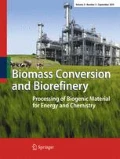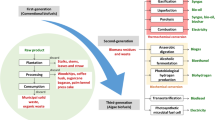Abstract
This paper discusses the thermal conversion of non-homogeneous residual biomass from urban wastes as well as from forest and agricultural operations into an ultrapure syngas used for the thermo-catalytic synthesis of methanol. The latter is a commodity/building block for subsequent synthesis of fuels and chemicals. This paper focuses on the feedstock choices made by Enerkem and on its conversion technology which embraces staged gasification, syngas conditioning and conversion of syngas into methanol and of the latter into ethanol. The fundamental concepts that have led to the development of the technology are the result of a joint R&D experimental effort between the Université de Sherbrooke, Enerkem and the Edmonton Waste Management Center of Excellence. The technology has been scaled up, from 2009 to 2011, and production of biomethanol using 1.5 tonnes/h of feed (dry basis) is ongoing at Enerkem's demonstration plant in Westbury (Québec) since June 2011. The conversion of the produced biomethanol into bioethanol has been proven at bench scale level, and we foresee the latter to be piloted in the first half of 2012. Based on the results of the demonstration, Enerkem is erecting a 100,000-tonne/year commercial plant in Edmonton. It will use secondary recovered fuel from the mechanical biological treatment process already implemented at the Edmonton Waste Management Center. Production of methanol is initially targeted for 2013.







Similar content being viewed by others
References
Marie-Rose SC, Perinet AL, Lavoie JM (2011) Conversion of non-homogeneous biomass to ultraclean syngas and catalytic conversion to ethanol. Biofuel's Engineering Process Technology 978-953-307-480-1
Gupta SC (2010) A practical way out of the GHG emissions problem. J Can Pet Technol 49:33–42. doi:10.2118/139840-PA
Marie-Rose SC, Chornet E, Lynch D, Lavoie JM (2011) From biomass-rich residues into fuels and green chemicals via gasification and catalytic synthesis. WIT Trans Ecol Environ 143:123–132
Lavoie JM, Beauchet R, Berberi V, Chornet M (2011) Biorefining lignocellulosic biomass via the feedstock impregnation rapid and sequential steam treatment. Biofuel's Engineering Process Technology 685-714 978-953-307-480-1
Chornet E, Valsecchi B, Avilla Y, Nguyen B, Lavoie J-M (2009) Production of ethanol from methanol. US Patent Application US 2009/0326080: US 2009/0326080 A1
Cybulski A (1994) Liquid-phase methanol synthesis: catalysts, mechanism, kinetics, chemical equilibria, vapor-liquid equilibria, and modeling, a review. Catal Rev 36:557–615. doi:10.1080/01614949408013929
Haynes A (2006) Acetic acid synthesis by catalytic carbonylation of methanol. Catalytic Carbonylation Reactions 179-205
Jones JH (2000) The CativaTM process for the manufacture of acetic acid. Platinum Metals Rev 44:94–105
Claus P, Lucas M, Lücke B, Berndt T, Birke P (1991) Selective hydrogenolysis of methyl and ethyl acetate in the gas phase on copper and supported group VIII metal catalysts. Appl Catal Gen 79:1–18, 0926-860X/91/$03.50
Chornet E, Valsecchi B, Drolet G, Gagnon M, Nguyen B (2010) Production and conditioning of synthesis gas obtained from biomass. US patent US 2010/0051875-A1
Chornet E, Valsecchi B, Rheault S, Gagnon M (2010) Production of synthesis gas through controlled oxidation of biomass. US Patent WO 2010/069068 A1
Acknowledgments
One of the authors (JML) acknowledges the financial support of the sponsors of the Industrial Chair in Cellulosic Ethanol: Quebec's government (MRNF), Greenfield Ethanol, CRB Innovations and Enerkem Inc. As well, Enerkem acknowledges co-funding from partners in the Edmonton project: the City of Edmonton and Alberta Innovates—Energy and Environment Solutions, as well as from the partners in the Westbury demonstration project: Sustainable Development Technologies Canada and the Bioenergy programme of the Ministère des Ressources Naturelles et de la Faune (MRNF) du Québec.
Author information
Authors and Affiliations
Corresponding author
Rights and permissions
About this article
Cite this article
Lavoie, JM., Marie-Rose, S. & Lynch, D. Non-homogeneous residual feedstocks to biofuels and chemicals via the methanol route. Biomass Conv. Bioref. 3, 39–44 (2013). https://doi.org/10.1007/s13399-012-0050-6
Received:
Revised:
Accepted:
Published:
Issue Date:
DOI: https://doi.org/10.1007/s13399-012-0050-6




